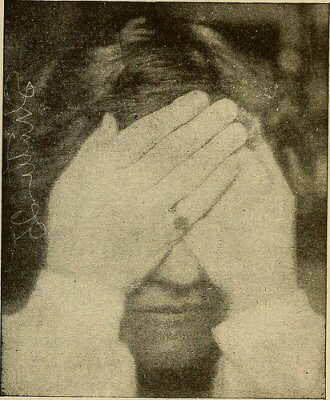Denial in Psychology- Are You Using This Defence Mechanism?
by Andrea M. Darcy
Denial in psychology originates from psychoanalytic theory and its ideas about ‘defence mechanisms‘.
What are defence mechanisms?
Defence mechanisms are unconscious forms of self-deception we use to avoid anxiety and emotional pain, or to ensure we are ‘acceptable’ to others.
Denial is a very popular defence mechanism. It is when we act as if an event, a thought, or an emotion never happened. We do this even if there is obvious evidence that it did, and often protest the opposite.
An example is when we cry all the time but then tell everyone we aren’t sad. Or when we are sick every morning from drinking the night before but say we are not an alcoholic.
Denial is connected to other defence mechanisms. These include repression (banning stressful things from our memories) and projection (refusing responsibility for thoughts, feelings and actions by attributing then to someone else).
[Is your habit of denial making your life a mess? Really wish someone could help? Visit our sister site harleytherapy.com to book phone and online therapy easily and quickly, worldwide.]
So if someone I know won’t see the truth, they are in denial?
It would be easy here to say denial is about denying ‘the truth’. But ‘truth’ is actually a perspective. If two people, for example, at the same meal, one might say it was amazing, the other that it was terrible.
So denial is more about avoiding facts and outcomes. It would be denying that the meal was caloric and might lead to weight gain, or claiming, even against strict doctors orders against its ingredients, that ‘it can’t hurt’.
But aren’t we all in denial?

By: Duncan Hull 🐝
As a Western society we practise mass denial. We live our lives as if all is fine when we are taking actions that damage the environment and when other countries are at war. This article, however, focuses on personal denial over societal denial.
The different forms of denial in psychology
In its purest form of ‘simple denial’ , the process of denial is unconscious. The person using denial really has convinced themselves of the opposite to what the facts say and what everyone else tells them. They have ‘turned a blind eye’, as the saying goes.
An example of simple denial would be the partner of an alcoholic who truly believes her partner ‘just likes a good time.’
Sometimes denial is more conscious, with the difficult situation admitted to, but downplayed. This is called ‘minimising’. An example would be the same person saying, ‘he does drink too much, but he’s never mean or horrible when he’s drunk so what’s the problem’.
The third form of denial is called transference denial. This is when the fact is admitted to, but the person will deny their responsibility. “Yes, he might be an alcoholic, but it’s not up to me to say anything.”
The symptoms of being in denial
- people often tell you that you are in denial, in the clouds, unrealistic, or a dreamer
- you do the same things again and again expecting a different result
- there is feeling that you are stuck in life
- you have a habit you don’t tell others like spending money, overeating, drinking alone, drugs
- instead of thinking about decisions you do what feels easiest or what those around you are doing
- when people ask you how you are feeling you say ‘fine’ without even thinking about it
- you try not to have any big emotions or upsetting thoughts.
Why does denial matter? Related psychological issues
Denial is common with addictions, grief, romance addiction, and personality disorders like narcissistic personality disorder and antisocial personality disorder.
It might seem easy to continue your habit of denial. But it leaves your life stuck, and can lead to:
Why are you in denial?
Defence mechanisms might seem crazy, but at the same time, they have a logical intention. They help us avoid emotional pain and anxiety.
Often the decision to use a defence mechanism is made in childhood, when perhaps our options are so limited it seems the only way to survive.
If a child, for example, lives with an abusive parent, it’s not like he or she can go out and get a job and take care of themselves. They are trapped living with that parent until perhaps someone calls social services. So perhaps they need to deny the reality of the situation as a way to keep going. Or if a child lives with a parent who punishes them for being sad and angry, they will learn quickly to hide their emotions.
The problem is of course that as adults we have more options. We can actually find effective solutions instead of live in denial. If we are being bullied at work, we can talk to HR, or file a complaint. If we have sadness and anger, we can talk to friends or a counsellor.
But if our brain was trained to resort to denial as a child, and we haven’t examined this habit and worked to change it, such as in therapy? We keep using the same defence mechanism, even when it means our life stays stuck in unhealthy places.
In summary, try not to beat yourself up for having defence mechanisms. At some point, they were the best option available.
How can therapy help me if my denial is holding me back?
Different forms of therapy approach denial in different ways, and you can choose a therapy based on which theories best suit you.
Psychoanalytical and psychodynamic therapies will see denial as something you eventually have to confront, and your therapist will help you do so when you are ready.
If you decide to work with a humanistic therapist, or to try existential therapy, your denial will be seen as part of your perspective. And you will explore this way of seeing with your therapist, then consider other options as part of your therapy.
Cognitive approaches like Cognitive Behavioural Therapy don’t really look at denial. They instead help you realign your thinking so you are better at dealing with stress, meaning you have less of a need to use coping mechanisms in the first place.
Want help with your habit of denial? Consider sessions with our premium London CBT therapists either in-person or online. For affordable counselling worldwide with our qualified, professional counsellors and psychotherapists, please visit our sister site harleytherapy.com to book online therapy.
 Andrea M. Darcy is a mental health and wellbeing writer and a mentor, trained in coaching and person-centred counselling. Find her on Instagram @am_darcy
Andrea M. Darcy is a mental health and wellbeing writer and a mentor, trained in coaching and person-centred counselling. Find her on Instagram @am_darcy






